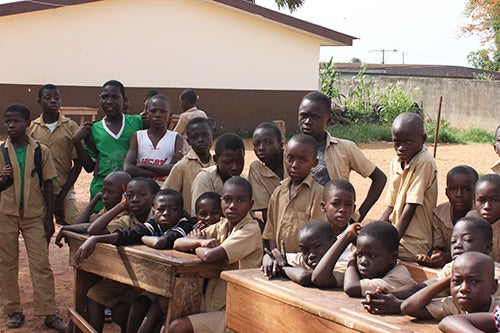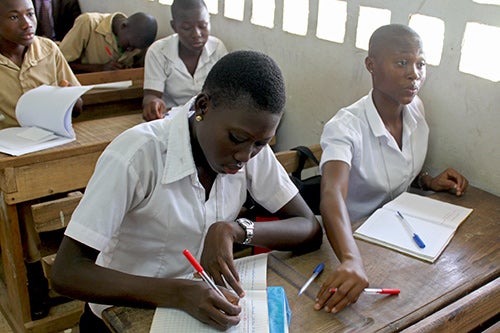News
School campaign aims to help Côte d’Ivoire reap demographic dividend
- 29 May 2015
News
DAKAR, Senegal – "I knew I was pregnant, but I talked to my classmate, not my parents or my teachers,” said Amina, 18, a student in Daoukro, Côte d’Ivoire. “My parents were very upset and not kind. They rejected me."
The young people of Côte d’Ivoire are poised to transform their country’s future. The country is in a position to reap a demographic dividend, the economic growth that can result from having a relatively large proportion of working-age people – provided those people are empowered, educated and employed. But stories like Amina’s show how easily their efforts can be derailed.
A nationwide campaign has been launched to help empower and educate Côte d’Ivoire's young people, and to prepare them for future employment. Starting in 2013, the Zero Pregnancies in Schools campaign has contributed to a staggering 20 per cent decline in youth pregnancies compared to the previous year.
“I have suffered and I felt alone,” Amina told UNFPA. Yet she is not alone: For every 1,000 girls aged 15 to 19 in Côte d’Ivoire, 125 become pregnant and give birth. Globally, this number is 50.

The repercussions of adolescent pregnancy are far-reaching. Many pregnant girls are forced to drop out of school, limiting their prospects and their contributions. The campaign, initiated by the Ivorian government with support from UNFPA, was designed to help young people stay in school.
Central to the programme is comprehensive sexuality education, which provides students with age-appropriate information about the human body, sexual and reproductive health, and the consequences of early pregnancy. The curriculum also addresses human rights issues, including gender-based violence and child marriage. The campaign also provides students with information about, and access to, contraception.
Dispelling myths is essential to helping young women avoid unplanned pregnancies. "I did not take contraceptives because my mom told me that it might make me sterile," Amina explained.
Clarissa, 22, said some girls are told that not becoming sexually active or not getting pregnant by age 15 or 16 "is a problem."
UNFPA has also helped the government open a call centre providing free, confidential information. Trained operators respond to over 200 calls a day from around the country, with the majority of callers aged 11 to 18.
Still, staying in school can be a trial. Many young people travel long distances just to attend.

"There are sometimes between 10,000 and 15,000 students in a city who come from elsewhere. They need housing, and boys and girls may share the same room," said Assoumou Kabran, of the Ministry of National Education and Technical Education.
"I came to live with my uncle in order to attend school,” said Clarissa, who is from Bouake. She attended school in Daoukro, some 165 km away, and struggled with loneliness. Last year, she became pregnant, and was forced to return home.
"We must invest in education to enable them to live better," Mr. Kabran said, adding that the government is planning to build more schools with proper boarding facilities.
Today, many girls who have become pregnant are working hard to return to school – they are no longer expelled for getting pregnant.
Both Amina and Clarissa are now back in class, with help from their parents.
“My mom takes care of my baby when I come to school,” Amina explained.
Clarissa also left her son in the care of her mother. “I lost a school year,” she told UNFPA, but she has not abandoned her dreams.
“I want to become a teacher,” she said.